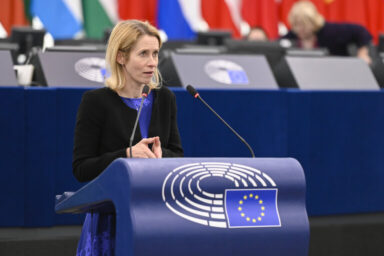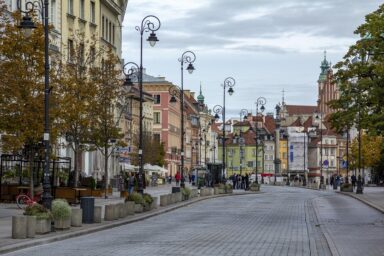The European Union has made little progress on migrant integration since 2019, according to the Migrant Integration Policy Index. Official policies in the field are only half-effective across the bloc, the latest report says.
Published on 25 September, 2025, by the Migration Policy Group (MPG), the report highlights persistent gaps between older and newer member states. Pre-2004 countries average 63/100, as the parlance has it. as post-2004 members trail at 44. Political participation remains the weakest area, scoring just 37. Overall policies enjoy implementation score of just over a half, or 54/100.
People in limbo
“Migrants often enjoy basic rights and some long-term security, but not equal opportunities,” Başak Yavçan, MPG’s head of research, offered an assessment in line with the logic of the matter in question. She noted incremental gains in education and anti-discrimination but warned of “worrying backsliding on access to citizenship and political participation”. Marianna Gorgerino, the report’s co-author, added that restrictive rules on family reunification risk “trapping people in limbo”.
Anti-discrimination policies scored highest (78/100), followed by permanent residence (61) and labour-market access (55). Education improved by three points since 2019, aided by spillover measures from Ukrainian refugee integration—such as enhanced translation services and school support in eastern states. But citizenship access fell by one point, with political participation slipping similarly.
The influx of Ukrainian refugees spurred some positive changes, including multilingual guidance and targeted healthcare. Yet these had “limited” broader impact, said Ms Yavçan. Germany and Spain emerged as bright spots: Germany eased citizenship rules in 2024, allowing dual nationality and shorter residency requirements. Spain passed a comprehensive anti-discrimination law in 2022. Portugal, Croatia, Slovenia and Greece also made strides in family reunification and labour reforms.
You might be interested
Gains, setbacks
Political participation faced setbacks. Luxembourg and Denmark weakened consultative bodies for migrants, while Finland and Ireland failed to inform migrants of rights. “If Europe wants cohesive, future-ready societies, investment in education, secure residence and democratic inclusion cannot wait,” argued Ms Yavçan.
The EU-14 (pre-2004 members) outscore newer states by 19 points overall—a gap reflecting diverging frameworks. Sweden, Finland and Portugal lead; most countries remain “halfway favourable”. The report urges EU institutions to prioritise education, secure residence and political rights. These include voting access and support for migrant-led groups. Equality bodies must expand mandates to enforce anti-discrimination laws.
If Europe wants cohesive, future-ready societies, investment in education, secure residence and democratic inclusion cannot wait. — Başak Yavçan, Migration Policy Group’s head of research
Restrictive approaches to citizenship and family reunification “undermine democratic inclusion”, the authors warn. Conversely, inclusive policies boost employment, public trust and social cohesion. Ms Gorgerino cited qualification recognition and stronger equality bodies as examples of effective reforms.
‘A really big one‘
For this report, MIPEX assessed 58 indicators across eight areas, from labour markets to health. The update forms part of MPG’s New Europeans Initiative, linking civic participation with economic inclusion.
MPG, a Brussels-based think-tank, advocates evidence-based migration policies. Its findings arrive as the EU implements its New Pact on Migration and Asylum. It is, of sorts, a test of whether rhetoric on integration will translate into action.
MIPEX, short for Migrant Integration Policy Index, was developed by MPG in order to evaluate integration frameworks across 31 countries. It uses, in all, 148 various indicators tied to international standards. Collaborating with 37 institutions, including the British Council, it assesses eight policy areas, from labour markets to family reunification. Guido Jansen of the British Council, which helped coordinate the study, called the MIPEX work “a really big one” compared with narrower integration analyses.
Uneven Germany
The report brought mixed results. Europe’s largest country, Germany, sits mid-table overall, but the report flagged its uneven performance. Its labour-market mobility score (77/100) exceeded averages, though foreign qualification recognition lagged. Critics highlighted restrictive language tests for overseas spouses. While perfectly reasonable to most Germans, they “may undermine family reunions”.
On a similar note, the country’s long-term residence rules were deemed Europe’s strictest (despite the fact that 4.4 million of Germany‘s residents were born outsde the European Union). However, the country’s citizenship test drew praise as “most professional”, and 2009 reforms limiting nationality revocation periods were commended.
Institutions such as non-government organisations have a weak position. — Guido Jansen, British Council
MIPEX noted integration policies evolve slowly—changes in one area rarely shift overall scores drastically. For instance, while Germany’s 2024 citizenship reforms eased dual nationality, broader gaps persist. NGOs and legal anti-discrimination measures remain weak compared with peers. “Institutions such as non-government organisations have a weak position,” Mr Jansen shared with Deutsche Welle an observation that may strike many as self-evident. The index underscores how incremental adjustments—like Spain’s 2022 anti-discrimination law—can improve specific outcomes without transforming national frameworks overnight.











